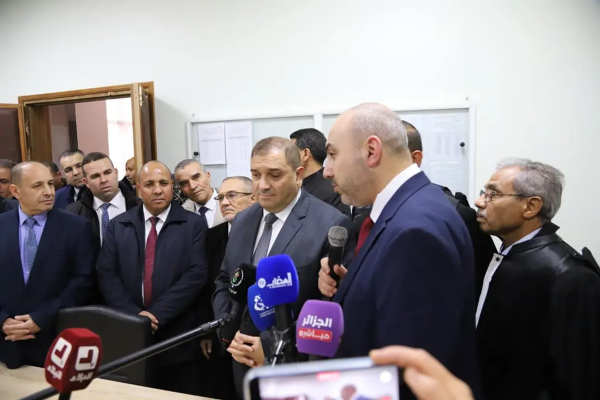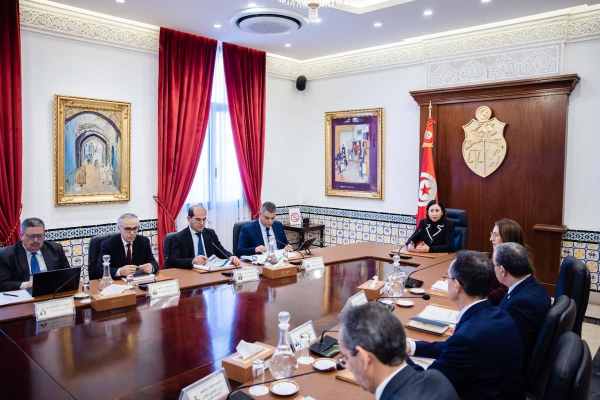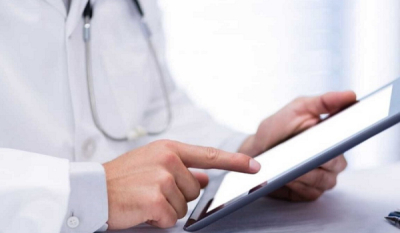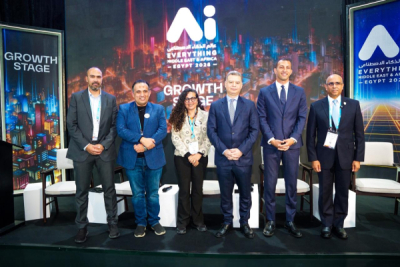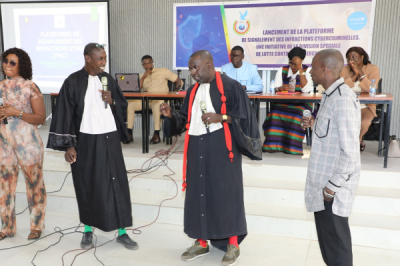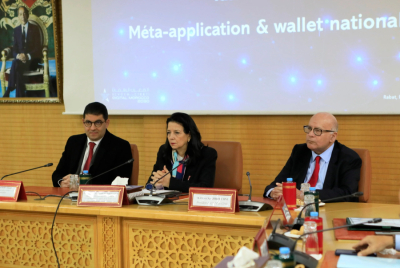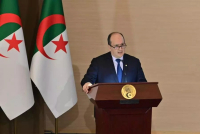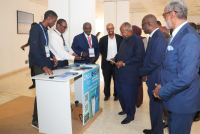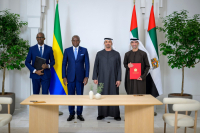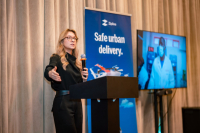
Tech (1148)
- Algeria launches online platform for certified court copies
- Lawyers receive electronically signed documents within 24 hours
- Initiative advances broader judicial digitalization efforts
Algeria's Justice Minister Lotfi Boudjemaa on Sunday announced the launch of a digital platform enabling lawyers to request and retrieve certified copies of court judgments and rulings online. He made the announcement from the Biskra Court on Feb. 15.
The initiative aims to simplify procedures and reduce physical trips to courthouses.
The platform allows lawyers to submit requests for certified copies from both ordinary and administrative courts and retrieve electronically signed documents. Each request is processed automatically and made available within 24 hours. According to the minister, the system modernizes court operations and improves responsiveness for legal professionals and litigants. Access is through each lawyer's electronic account on the Justice Ministry's digital interface for exchanging petitions and briefs.
The initiative is part of a broader push to digitize judicial services in Algeria. Since May 2024, a national electronic portal has allowed case tracking and retrieval of simple copies of judgments and rulings from any court in the country, reducing delays and travel for litigants and their lawyers.
Like Algeria, several African countries have pursued digital modernization of their judicial systems. In Morocco, digital platforms allow lawyers to file documents electronically, track case progress and access certain records such as criminal background checks or court decisions. In Rwanda, the Integrated Electronic Case Management System handles digitization of case filing, case tracking and virtual hearings, making procedures more accessible and transparent for litigants.
Samira Njoya
-
Tunisia will implement 192 digital projects and launch full public service digitalization from 2026.
-
Authorities will expand online services, electronic payments and interoperability under the 2026–2030 development plan.
-
Internet penetration reaches 84% of the population, supporting e-government expansion.
The government announced that Tunisia will rely on 192 digital projects to accelerate administrative modernization and initiate full digitalization of public services starting in 2026. Officials made the announcement after a cabinet meeting dedicated to monitoring the digital transition, which took place on Friday, February 13, at the Kasbah Palace.
Prime Minister Sarra Zaâfrani Zenzri chaired the meeting and stated that digital transformation represents a pillar of the state’s economic and social program. The government plans to strengthen online services, generalize electronic payments and ensure interoperability among public institutions under the 2026–2030 development plan.
The executive branch stated that modernization will simplify administrative procedures, reduce processing times, improve transaction transparency and support the country’s economic attractiveness. Authorities also aligned the strategy with efforts to combat corruption, tax fraud and informal practices.
Several flagship projects were already operational at the end of 2025. The government launched a unified portal for administrative services, introduced an electronic tax stamp, enabled remote payment of certain taxes and implemented the first phase of a digital hospital program. Authorities also deployed platforms dedicated to building permits and online administrative procedures. Other initiatives focus on interconnecting public services and developing digital solutions for citizens and businesses.
Tunisia’s relatively high level of digital adoption supports these efforts. DataReportal’s “Digital 2026: Tunisia” report indicates that about 84% of the population uses the internet, while mobile connections exceed 125% of the population. This environment creates favorable conditions for the expansion of online public services.
Authorities plan to prioritize projects that deliver direct impact for users and investors while strengthening cybersecurity and data protection requirements. The government will also implement a national communication plan to promote citizen adoption of digital services.
This article was initially published in French by Samira Njoya
Adapted in English by Ange J.A de Berry Quenum
- CNSS to launch pilot of electronic health claim form in Kenitra
- Nationwide rollout planned between April and June 2026
- Reform aims to cut delays, reduce costs, and secure data flows
Morocco will launch the pilot phase of its electronic health claim form (FSE) in Kenitra by the end of March 2026, according to the National Social Security Fund (CNSS). The initiative marks the first step toward fully digital processing of medical claims, with a gradual nationwide rollout planned between April and June, subject to technical and regulatory validation.
The electronic system allows doctors, pharmacists, and other health professionals to transmit consultation, examination, and prescription data directly to health insurance providers without using paper forms.
Under the new process, each prescriber issues prescriptions through dedicated software or the CNSS FSE portal. Patients receive a prescription with a QR code and a unique FSE number. When services are delivered, providers scan the QR code to access the file and record completed procedures, ensuring real-time and secure tracking.
The reform forms part of a broader effort to digitalize Morocco’s healthcare system. The objective is to improve care coordination, shorten reimbursement timelines, and enhance the reliability of administrative data.
It complements other initiatives, including the Shared Medical Record (DMP) and the planned digital health card, both designed to centralize health data, simplify access to care, and generate savings for insurance funds.
Beyond administrative simplification, the FSE carries strategic weight. Healthcare accounts for about 6% of Morocco’s GDP, compared with around 10% in developed economies. The sector faces high administrative costs and reimbursement delays that affect both insured patients and providers.
The electronic claim system is expected to improve data accuracy, reduce disputes linked to paper files, and lower management costs, currently estimated at several hundred million dirhams per year for health insurance funds. It also aims to modernize oversight and performance monitoring of the national health system.
Samira Njoya
- Egypt launches “Egypt Innovate” national digital platform
- Platform connects 780 entities and 81,000 users
- Aims to boost funding access, innovation ecosystem coordination
On Thursday, February 12, Egypt unveiled "Egypt Innovate" in Cairo, the country's first fully integrated national digital platform for innovation and entrepreneurship. The launch took place during the AI Everything Middle East & Africa exhibition at the Egypt International Exhibition Center, with delegations from over 30 countries in attendance.
Developed and operated by a consortium led by Entlaq, alongside partners Robusta and Kamelizer, the platform establishes a public-private alliance designed to unite startups, investors, universities, research centers, and public institutions within a single digital ecosystem.
Ahmed ElZaher, CEO of ITIDA, explained that the platform supports the national strategy to build a knowledge-based economy by using data and advanced technologies to drive sustainable growth. It aims to facilitate funding access through a dynamic database that showcases young companies' business models and value propositions, while elevating Egypt's entrepreneurial ecosystem on regional and international stages.
The platform places particular emphasis on Arabic-language content, which authorities view as essential for digital inclusion and local skills development. Officials believe that providing technical and entrepreneurial resources in founders' native language broadens access to opportunities and reinforces Egypt's standing as a regional innovation hub.
Following its pilot phase, Egypt Innovate now connects 780 entities, including startups, investors, incubators, and research centers, and hosts over 3,700 pieces of sector-specific content. The community comprises more than 81,000 registered users, supported by a network of expert advisors.
The platform's functionality centers on data-driven and AI-powered tools: a digital assistant, an interactive ecosystem map, an automated matching system linking startups with investors, and a learning center offering training, mentorship, and entrepreneurial simulations. A self-verification mechanism, where entities directly update their own information, helps ensure data reliability and accuracy.
Egypt Innovate joins multiple existing initiatives aimed at structuring and financing the country's entrepreneurial ecosystem, which ranks among the region's most dynamic. In 2025, Egyptian startups raised nearly $614 million in venture capital and debt financing, according to the Ministry of Planning, Economic Development and International Cooperation. This figure reflects growing investor confidence. Within this context, Egypt Innovate seeks to strengthen stakeholder coordination and streamline funding access in an increasingly mature market.
Samira Njoya
-
Senegal’s National Police launched an online cybercrime reporting platform on February 12.
-
The platform enables secure pre-reporting of a wide range of digital offenses, with a focus on child protection.
-
Interpol estimates cybercrime losses in Africa exceeded $3 billion between 2019 and 2025.
Senegal’s General Directorate of the National Police (DGPN) officially launched a cybercrime reporting platform on Thursday, February 12, as authorities seek to respond to rising digital offenses.
Authorities made the platform accessible via signalementcyber.dgpn.sn. The initiative aims to facilitate the reporting and monitoring of cybercrime cases, which continue to increase alongside the rapid adoption of mobile telephony, internet services and mobile money across Africa. Authorities placed particular emphasis on protecting children online.
The platform allows users to securely and confidentially report a broad range of digital offenses. Users can report fraud, unauthorized content distribution, dissemination of obscene material, online harassment, defamation, digital extortion, child sexual abuse material, hate content, unlawful system intrusion, account hacking, identity theft, SIM swap fraud, romance scams, fake investment schemes, mobile money scams, fraudulent access to mobile money accounts, fake online recruitment, fraudulent payments and fake online sales.
“The system offers victims the possibility of making an online pre-report before formally filing a complaint with the competent services, thereby facilitating access to justice and the rapid handling of cases. Developed internally by engineers of the national police, the online cybercrime reporting platform constitutes a major lever for public sector reform and the strengthening of community policing,” Deputy Director of the Judicial Police Moustapha Diouf said, as quoted by local media outlet SocialNetLink.
Authorities launched the platform amid accelerated digital transformation across Africa, where telecom, internet and social media adoption continue to expand. However, this expansion has coincided with a rise in online offenses, particularly financial scams and personal data breaches. Interpol estimated that cybersecurity incidents across the continent caused financial losses exceeding $3 billion between 2019 and 2025.
In Senegal, authorities framed the initiative as part of a broader cybersecurity strengthening strategy, which policymakers consider essential to fully leverage digital transformation, according to the International Telecommunication Union (ITU). In its 2024 Global Cybersecurity Index, the ITU ranked Senegal in Tier 3 and assessed its regulatory framework, technical measures and cooperation mechanisms as satisfactory. However, the organization identified remaining gaps in capacity development and organizational measures.
This article was initially published in French by Isaac K. Kassouwi
Adapted in English by Ange J.A de Berry Quenum
-
Morocco signed eight memorandums of understanding to launch the operational phase of the Idarati X.0 unified digital services platform.
-
Authorities will build the system around a national digital wallet authenticated through the electronic national identity card (CNIE).
-
Morocco ranks 90th globally and 4th in Africa in the 2024 UN E-Government Development Index, with 600 public services already online.
Morocco is accelerating the structuring of its e-government ecosystem. Authorities signed eight memorandums of understanding in Rabat on Tuesday, February 10 to launch the operational phase of the “Idarati X.0” project, a meta-application designed to become the single entry point for digital public services.
The Ministry of Digital Transition and Administration Reform leads the project in coordination with the National Commission for the Control of Personal Data Protection (CNDP). The initiative aims to structure a comprehensive ecosystem around a national digital wallet. Authorities will use this core infrastructure to allow citizens to access multiple administrative services through a single interface, relying on the electronic national identity card (CNIE) as the authentication foundation.
The agreements commit several key institutions, including the Ministry of Youth, Culture and Communication, the Ministry of Transport and Logistics, the National Social Security Fund (CNSS), the National Road Safety Agency (NARSA), and the National Agency for Land Conservation, Cadastre and Cartography (ANCFCC). Other public administrations also joined the framework, underscoring a cross-sector approach based on system interoperability.
Authorities designed Idarati X.0 as more than an aggregator of existing services. The project seeks to redesign user pathways, reduce fragmentation across public platforms and centralize interactions between citizens and the administration. Project leaders structured the rollout into four phases, ranging from an initial benchmark to the assessment of capital expenditures (Capex) and operating costs (Opex), over an estimated six-month period.
Authorities placed data protection at the center of the framework. Project leaders adopted “privacy by design” and “security by design” principles and integrated regulatory compliance and cybersecurity requirements at the technical design stage. The CNDP participates in the process to ensure alignment with national standards on data confidentiality and governance.
The initiative forms part of the broader “Maroc Digital 2030” strategy, which seeks to accelerate the dematerialization of procedures, strengthen digital inclusion and improve public service quality. In 2024, authorities had already placed 600 public services online, including 300 for citizens, 200 for businesses and 100 for public administrations. This performance positions Morocco among Africa’s leaders in digital transformation.
Morocco ranks 90th globally and 4th in Africa in the United Nations 2024 E-Government Development Index (EGDI), with a score of 0.6841 out of 1, exceeding both African and global averages.
Morocco’s digital environment supports such initiatives. DataReportal reports that the country counted more than 35.3 million internet users at the end of 2025, representing a penetration rate of around 92% of the population. Mobile connections exceeded 54.9 million, reflecting widespread mobile adoption and large-scale internet access.
Samira Njoya
- Algeria launched a national data governance framework to support state modernization and digital transformation.
- The system will establish a legal, institutional, and technical framework for managing public data.
- The initiative aligns with “Digital Algeria 2030” and builds on recent investments in five regional data centers.
Algerian Prime Minister Sifi Ghrieb officially launched the national data governance framework on Monday, February 9. Authorities presented the initiative as a foundation for state modernization and faster digital transformation.
According to the Prime Minister, the framework establishes a sovereign model based on data control, organization, and protection. Authorities classify data as a strategic asset and aim to shift from traditional administrative governance to digital governance based on the use of reliable data to improve public decision-making.
The system provides a legal, institutional, and technical framework to organize the collection, storage, sharing, and use of public data. The framework will strengthen information system security, ensure interoperability between public administrations, and establish a unified national database of data sources. As a result, institutions will exchange information through secure and standardized channels, reduce data silos, improve the reliability of public statistics, and support the development of digital services based on centralized and regularly updated data.
The initiative aligns with the “Digital Algeria 2030” strategy, which targets administrative modernization and the development of the digital economy. Algeria has already launched several public service digitization projects and strengthened digital infrastructure, including the commissioning of five regional data centers dedicated to hosting and securing public information.
The government formally anchored the national data governance framework in Presidential Decree No. 25-350 of December 30, 2025. Authorities now expect the framework to serve as the backbone for structured public data use. Policymakers anticipate stronger coordination between administrations, more reliable public decision-making, and a clearer regulatory environment for economic operators, as data increasingly drives digital transformation and national economic attractiveness.
Samira Njoya
-
Djibouti launched its Mobile ID platform to enable secure digital identification and access to public and private services.
-
The government positioned Mobile ID as a core pillar of administrative modernisation and digital economy development.
-
Authorities pledged to store biometric data exclusively at the Interior Ministry to address privacy and data sovereignty concerns.
Djibouti President Ismail Omar Guelleh officially launched the Mobile ID platform on Monday, February 9. The launch took place alongside the closing session of the National Digital Identity Forum held at the People’s Palace under presidential patronage.
The government designed Mobile ID to simplify and secure citizen access to public and private services. The platform enables electronic authentication through smartphones or a unique digital identifier. Authorities aim to reduce administrative procedures, strengthen transparency in state interactions and anchor Djibouti in a modern digital economy.
Priority use cases include access to civil registry services, tax procedures, bank account opening and electronic signature of official documents.
Beyond administrative simplification, the government plans to use Mobile ID as a data interoperability tool. Authorities expect the platform to integrate documents such as driving licences and selected health information around a single citizen identifier.
The Interior Minister illustrated this objective by citing emergency medical care. He said a doctor could quickly access essential patient health data through a biometric identifier during urgent treatment.
The project forms part of a broader public administration modernisation strategy. Authorities aligned the initiative with programmes such as “Djibouti, Foundation of Digital,” a five-year plan that aims to expand broadband infrastructure, promote digital skills and strengthen mobile and internet coverage nationwide.
The launch comes as connectivity gradually improves. DataReportal data showed Djibouti recorded 616,000 active mobile cellular connections at the end of 2025, representing 51.9% of the population. The data also showed 772,000 internet users, corresponding to a penetration rate of 65%.
However, project success depends largely on data security. The government addressed privacy concerns by stating that the Interior Ministry will store citizens’ biometric data exclusively.
Authorities said other institutions will access information only through a secure system that exchanges encrypted requests and responses between servers. The government said the architecture will preserve data sovereignty and confidentiality.
This article was initially published in French by Samira Njoya
Adapted in English by Ange J.A de BERRY QUENUM
- Gabon signed a memorandum of understanding with Presight, a subsidiary of UAE-based G42, to support digital government reforms.
- The partnership focuses on artificial intelligence, advanced analytics, and big data for public administration.
- Presight already works with African governments and trades on the Abu Dhabi Securities Exchange.
Gabon’s Ministry of Digital Economy signed a memorandum of understanding with Presight on Friday, February 6, on the sidelines of high-level discussions held in Abu Dhabi. Presight operates as a subsidiary of UAE-based technology group G42. The agreement aims to support the digital transformation of public administration and several strategic state services.
À Abu Dhabi, le Gabon a signé trois Mémorandums d’Entente stratégiques dans les secteurs minier, numérique et logistique.
— Présidence de la République Gabonaise (@PresidenceGA) February 6, 2026
Ces accords s’inscrivent dans la vision du Président de la République, S. E. @oliguinguema, visant à accélérer la transformation économique et renforcer… pic.twitter.com/hkZcUEH6bP
Authorities said the cooperation will focus on deploying artificial intelligence, advanced analytics, and big data solutions. The partnership seeks to improve public data management, optimize administrative services, and strengthen decision-support capabilities. Governments typically use such solutions to modernize state information systems, automate selected processes, and improve service delivery to citizens and businesses.
This partnership comes as digital transformation ranks among Gabon’s top policy priorities. DataReportal said Gabon recorded about 1.8 million internet users in 2025, representing nearly 71.9% of the population, while mobile connections exceeded 3.27 million. However, public service digitalization and nationwide data governance remain key challenges for improving administrative efficiency and supporting economic diversification.
Presight operates across multiple markets and has already formed partnerships with governments and institutions in Africa, including in Gambia and Côte d’Ivoire, on projects related to artificial intelligence, security, and public data management. The company trades on the Abu Dhabi Securities Exchange and positions itself as a major exporter of AI solutions developed in the United Arab Emirates.
With this memorandum, Libreville and Presight have laid the groundwork for cooperation expected to take shape in the coming months. Future operational agreements will define project scope, implementation modalities, and associated investments, as Gabon seeks to build a more coherent digital strategy aligned with its public sector modernization priorities.
Samira Njoya
-
Rwanda signed an expansion agreement with Zipline to build a national autonomous drone delivery network.
-
The deal includes Africa’s first urban drone delivery system and a new long-range distribution hub.
-
Zipline plans to establish its first international AI and robotics testing center in Rwanda.
Rwanda signed a strategic expansion agreement with Zipline on Thursday, February 6, to become the first country globally to operate a national autonomous drone delivery network, including Africa’s first urban drone delivery system. The agreement forms part of a $150 million grant awarded to Zipline by the U.S. Department of State, with Rwanda acting as the first beneficiary.
“The Rwanda-Zipline partnership has worked for years to deploy technology in service of our people. We have seen the extraordinary impact of drone delivery by saving time, saving money and saving lives. Through this partnership, we will now expand urban delivery and extend these benefits to even more communities,” said Paula Ingabire, Rwanda’s Minister of ICT and Innovation.
Rwanda will become the first African country to deploy Zipline’s urban delivery system, Platform 2. The technology enables fast, quiet and highly precise deliveries in dense urban environments such as Kigali, which accounts for nearly 40% of national healthcare demand. Zipline already operates the platform in the United States, where it delivers tens of thousands of retail and grocery items directly to homes and public locations.
The agreement also includes reinforcement of the existing delivery network through the opening of a third long-range distribution center in Karongi district, complementing the Muhanga and Kayonza hubs. This infrastructure will extend delivery coverage beyond the Nyungwe forest toward districts bordering the Democratic Republic of Congo, thereby improving territorial equity in access to essential medical products.
Beyond logistics, Zipline plans to establish its first international testing center dedicated to artificial intelligence and robotics in Rwanda. The research and development facility will test new safety systems, next-generation logistics software and aircraft performance under varied climate conditions. The center will also support local talent development and create highly skilled jobs in advanced technologies.
The new agreement builds on a long-term partnership between Rwanda and Zipline. The U.S. company has operated in Rwanda since 2016 and has renewed its partnership several times, including a $61 million contract signed in December 2022. That contract targets expanded delivery sites in rural and urban areas, with plans to triple volumes and reach nearly 2 million deliveries by 2029, covering more than 200 million kilometers flown by autonomous drones.
According to company data, the partnership has contributed to a 51% reduction in maternal mortality in covered areas. The real-time integration of delivery data into national health and emergency systems has also strengthened epidemiological surveillance and crisis response capacity.
This article was initially published in French by Samira Njoya
Adapted in English by Ange J.A de BERRY QUENUM
More...
-
Onafriq and PAPSS launched a pilot for local-currency payments from Nigeria to Ghana.
-
The partnership bypasses the dollar to reduce costs and speed up cross-border trade.
-
The initiative supports AfCFTA implementation and intra-African commerce growth.
On February 2, Onafriq Nigeria Payments, a fintech licensed by the Central Bank of Nigeria, announced a partnership with the Pan-African Payment and Settlement System. The partnership pilots a service that allows users to send money from a wallet or bank account in Nigeria to a beneficiary in Ghana. The initiative aims to facilitate payments between the two countries in local currencies without using the dollar in order to support intra-African trade under the African Continental Free Trade Area.
PAPSS, which AfCFTA authorities adopted as a reference platform for implementation, operates as a shared infrastructure that routes and settles payments between African banks, fintechs and mobile money operators. The platform offers an alternative to traditional correspondent banking networks, which often impose higher costs and longer settlement times for cross-border payments. By relying on this platform, Onafriq converts connected mobile wallets and bank accounts into access points to a pan-African real-time payment network.
Today, a small or medium-sized enterprise that imports from Ghana to Nigeria or exports in the opposite direction typically uses international banking channels. These channels impose multiple layers of fees, processing delays that stretch over several days, and near-systematic conversion through the dollar or the euro. These constraints weigh more heavily on small firms, which face limited capacity to absorb foreign exchange costs and payment delays.
The Onafriq–PAPSS pilot offers near-instant local-currency payments between Nigeria and Ghana through familiar wallet and banking application interfaces. Mxolisi Msutwana, managing director for Anglophone West Africa at Onafriq, said: “This is how we open bidirectional trade corridors, reduce costs for businesses and empower African enterprises to trade confidently in their own currency. The vision is continental, but it starts with concrete actions like this.”
Ositadimma Ugwu, chief information officer at PAPSS, added: “With this move, we challenge this mindset by enabling Nigerians to send money to their neighbors as easily as they send a text message.”
A Key Component of AfCFTA Implementation
According to Afreximbank’s Africa Trade Report 2025, intra-African trade reached $220.3 billion in 2024, representing a 12.4% increase from 2023. The figure remains below the estimated potential of $296.3 billion. The report states that AfCFTA can help close this gap if countries also strengthen financial infrastructure. In this context, solutions such as PAPSS, combined with private mass-payment networks, represent practical tools to convert trade agreements into real transactions and support AfCFTA implementation.
“The Pan-African Payment and Settlement System reduces dependence on foreign currencies and improves the efficiency of intra-African trade, while national digital payment ecosystems expand rapidly and generate billions of dollars in annual revenues,” Afreximbank said in the report.
This article was initially published in French by Melchior Koba
Adapted in English by Ange J.A de BERRY QUENUM
-
Ivory Coast plans to regulate and organize digital content monetization by 2026.
-
The government opened talks with regulators and industry partners to define revenue-sharing mechanisms.
-
Streaming growth highlights rising economic stakes but exposes persistent income gaps for artists.
The Ivorian government announced its intention to make digital content monetization effective by 2026 in response to demands from cultural, music and media stakeholders. Culture and Francophonie Minister Françoise Remarck opened discussions on February 2, with the High Authority for Audiovisual Communication (HACA) and several sector partners to define mechanisms to valorize locally produced digital content.
The initiative seeks to establish a regulatory and operational framework to capture and redistribute a significant share of revenues generated from online listening, music streaming, video and audiovisual content. The executive branch aims to structure an ecosystem in which local and international digital platforms compensate artists and creators under clear rules while authorities strengthen copyright regulation and distribution contracts.
The issue carries growing economic weight. The International Federation of the Phonographic Industry said in its Global Music Report 2025 that sub-Saharan Africa recorded a 22.6% increase in recorded music revenues in 2024, reaching a record $110 million, or nearly five times the global growth rate of 4.8% over the same period.
In Ivory Coast, music streaming platforms such as Boomplay, Spotify, Apple Music and Deezer continue to expand their user bases. Compensation models vary across platforms and markets. By way of indication, one million streams on Spotify can generate about CFA1.2 million, or roughly $2,155, for rights holders, highlighting both the economic potential of streaming and persistent revenue disparities.
Despite expanding digital audiences, monetization remains limited for many artists in Francophone Africa. Contract structures and regulatory frameworks continue to allow a significant share of value creation to escape local creators.
The Ivorian initiative also aligns with a broader push to develop the national digital economy. The country benefits from relatively solid mobile infrastructure. Fourth-generation network coverage reached 76.88% in the first quarter of 2025, improving access to digital services and content distribution platforms.
By structuring digital content monetization, Abidjan aims to integrate the creative economy more fully into the formal sector, strengthen revenues for local artists and producers, and position digital culture as a driver of economic growth and employment as streaming and digital content markets continue to expand across Africa.
This article was initially published in French by Samira Njoya
Adapted in English by Ange J.A de BERRY QUENUM
-
Kenya launched a private outsourcing coalition targeting 100,000 digital jobs by 2026.
-
Four major operators founded the alliance with government backing.
-
The government linked outsourcing growth to youth employment and training programs.
Kenya targets business process outsourcing to create digital jobs and attract investors as it seeks to position itself as a regional hub for corporate services.
The country faces persistent youth underemployment. In response, policymakers now promote outsourced digital services as a growth engine for employment and foreign investment.
Four major business services operators launched this week the Outsourcing Alliance of Kenya (OAK) in an unprecedented private-sector initiative.
The coalition aims to structure and accelerate the development of Global Business Services, including business process outsourcing and outsourced IT services. The Ministry of Information, Communications and the Digital Economy announced the launch on its X account on Thursday, February 5, marking a new phase for a sector expected to play a central role in job creation.
The Outsourcing Alliance of Kenya officially launched on February 3, 2026, according to a statement published by the ministry.
𝐊𝐞𝐧𝐲𝐚'𝐬 𝐆𝐥𝐨𝐛𝐚𝐥 𝐁𝐮𝐬𝐢𝐧𝐞𝐬𝐬 𝐒𝐞𝐫𝐯𝐢𝐜𝐞𝐬 𝐒𝐞𝐜𝐭𝐨𝐫 𝐑𝐞𝐚𝐜𝐡𝐞𝐬 𝐍𝐞𝐰 𝐌𝐢𝐥𝐞𝐬𝐭𝐨𝐧𝐞𝐬 𝐰𝐢𝐭𝐡 𝐋𝐚𝐮𝐧𝐜𝐡 𝐨𝐟 𝐎𝐮𝐭𝐬𝐨𝐮𝐫𝐜𝐢𝐧𝐠 𝐀𝐥𝐥𝐢𝐚𝐧𝐜𝐞
The Outsourcing Alliance of Kenya (OAK) was officially launched on February 3, 2026, signaling… pic.twitter.com/NjaNNt3g7M
— Ministry of Info, Comms & The Digital Economy KE (@MoICTKenya) February 5, 2026
Government representatives attended the event. Kenyan Wall Street reported that the alliance brings together CCI Kenya, CloudFactory Kenya, Teleperformance Kenya and Sama Kenya. The coalition plans to expand to more than 20 members by the second quarter of 2026 and aims to help create 100,000 jobs across the value chain.
John Tanui, Principal Secretary for ICT and the Digital Economy, said in a speech read at the event that Global Business Services expansion provides inclusive opportunities for young people.
He said the government supports the sector through targeted policies, adapted regulatory frameworks and measures that facilitate access to international markets. He added that the state relies on training programs such as Ajira Digital and Jitume, which aim to equip Kenyan youth with skills demanded by the global outsourcing market, according to the Ministry of the Digital Economy.
This initiative comes as Kenya records an unemployment rate of about 5.2% in 2025, with youth facing particularly difficult labor market conditions.
At the same time, internet penetration reaches 48% in 2025. The rate remains below advanced-market levels, but steady growth strengthens the foundation for digital services and outsourcing development.
This article was initially published in French by Félicien Houindo Lokossou
Adapted in English by Ange J.A de BERRY QUENUM
-
Mourana Soumah takes charge of Guinea’s Ministry of Communication, Digital Economy, and Innovation, merging information, telecom, and digital portfolios.
-
He brings extensive finance experience, having modernized state treasury operations and represented Guinea at the IMF, World Bank, and AfDB.
-
Key priorities include expanding connectivity to over 600 unserved areas, strengthening cybersecurity, and promoting digital innovation in public services and education.
Guinea appointed Mourana Soumah as Minister of Communication, Digital Economy, and Innovation on February 2, President Mamadi Doumbouya’s office announced. The new ministry merges the former Ministry of Information and Communication, previously led by Fana Soumah, with the Ministry of Posts, Telecommunications, and Digital Economy, formerly overseen by Rose Pola Pricemou.
Soumah holds a degree in economics from Université Gamal Abdel Nasser de Conakry, a master’s in economic policy management from CERDI-Université d’Auvergne, France, and a diploma from the ENA Paris-Strasbourg in public finance. He also completed specialized training at the IMF, French Ministry of Finance (Bercy), BCEAO, and institutions in Canada and Morocco.
He served as Minister of Economy and Finance from March 2024, implementing reforms to modernize state financial management, strengthen public treasury operations, and enhance budget credibility. He represented Guinea at the IMF, World Bank, and African Development Bank, and chaired strategic national committees including the Simandou Strategic Committee and the C2D Steering Committee.
Prior to government service, Soumah led the General Directorate of the Treasury and Public Accounting (2021–2024) and the Central Accounting Agency of Treasury Deposits. He contributed to reforms such as the implementation of the Single Treasury Account (CUT), the Integrated State Accounting System (SCIE), and the national payments system.
In his new role, Soumah will focus on modernizing public communication, accelerating digital transformation across government, strengthening national digital sovereignty, and promoting innovation as a driver of economic growth, transparency, and inclusion. Officials plan to expand connectivity to more than 600 unserved areas, develop digital services in education and public administration, and reinforce cybersecurity and local data hosting.
Guinea had 14.2 million mobile connections in 2025, covering roughly 95% of the population, while Internet penetration reached 26.5%, or about four million users, according to DataReportal. Mobile Internet subscriptions have surged nearly 97.4% in recent years, reflecting rapid adoption of digital services and emphasizing the urgency of the government’s digital agenda.
This article was initially published in French by Samira Njoya
Adapted in English by Ange J.A de BERRY QUENUM


